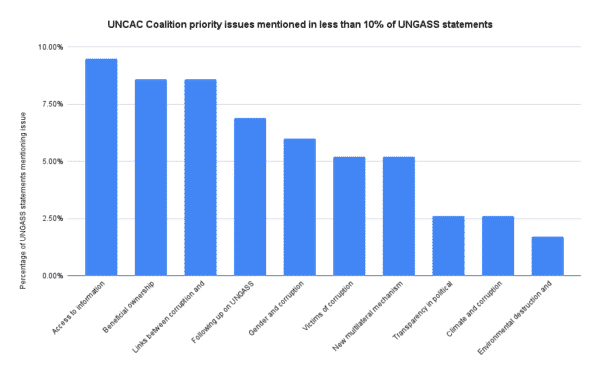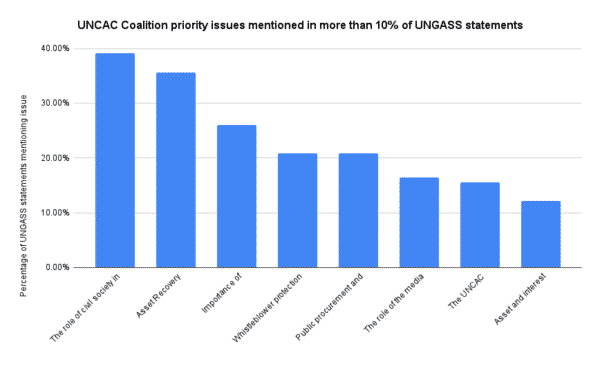22 June 2021 –
How many countries highlight the role of civil society and the media in anti-corruption efforts, how many emphasize the role of whistleblowers? How many countries prioritize transparency in political financing and asset declarations of public officials in their anti-corruption efforts? And how many States see progress in the recovery and return of stolen assets as an international priority?
116 countries spoke during the recent first-ever Special Session of the UN General Assembly (UNGASS) on corruption. We took a closer look at what topics world leaders, Heads of States, ministers, heads of anti-corruption bodies, and ambassadors raised as priorities of their respective countries.
The mentioning of specific issues, whether in the context of developments, challenges or achievements, on the national, or the international level, indicates a certain level of importance and focus countries give to these issues, as part of their efforts to combat corruption. In the 115 national statements we documented during the UNGASS General Debate (Including the statement of the European Union), focusing on our issues of priority, we found that:
- The role of civil society in fighting corruption was mentioned by 45 Member States (39.1%)
- Asset recovery was mentioned by 41 Member States (35.6%)
- A general reference to the importance of transparency: 30 Member States (26%)
- Whistleblower protection: 24 Member States (20.8%)
- Public procurement and budget transparency: 24 Member States: (20.8%)
- The role of the media: 19 Member States (16.5%)
- The UNCAC Implementation Review Mechanism: 18 Member States (15.6%)
- Asset and interest declarations of public officials: 14 Member States (12.1%)
- Access to information: 11 Member States (9.5%)
- Beneficial ownership transparency and company registries: 10 Member States (8.6%)
- Links between corruption and forms of organized crime: 10 Member States (8.6%)
- Following up on UNGASS commitments: 8 Member States (6.9%)
- Gender and corruption: 7 Member States (6%)
- Victims of corruption: 6 Member States (5.2%)
- A possible new multilateral mechanism to address gaps in the fight against corruption (several countries specifically mentioned it in the context of asset recovery): 6 Member States (5.2%)
- Transparency in political financing: 3 Member States (2.6%)
- Climate and corruption: 3 Member States (2.6%)
- Environmental destruction and corruption: 2 Member States (1.7%)


You can find the data with country breakdowns in this spreadsheet. This analysis is based on the summaries we created of the country statements on our live blog of the UNGASS. Despite our best efforts to provide comprehensive summaries, we may have missed relevant references in some country statements, so it is possible that we have under-counted some of the references. In case you spot any inaccuracies, please don’t hesitate to notify us at info@uncaccoalition.org so that we can correct them.
Main findings
- Hardly any Member States announced new commitments or specific new initiatives efforts to tackle corruption. Instead, many States extensively discussed aspects relating to past and ongoing reforms of their domestic legislation, including on the criminalization of corruption offenses, as well as the adoption and implementation of anti-corruption strategies. Numerous countries also highlighted the alleged political commitment of their leaders to tackle corruption. Specific issues that were mentioned by numerous States included: International cooperation, bribery, illicit financial flows, money laundering, e-governance, the integrity of the public and private sector, the independence of the judiciary, the capacity of anti-corruption bodies, the rule of law, anti-corruption education, and corruption and the 2030 agenda.
- The role of civil society: We noticed extensive mentioning of the role of civil society in the fight against corruption in the national statements which is encouraging, including by many countries that are not perceived as being “civil society-friendly”. In the UNCAC fora deliberations, the role of civil society is highly contentious. However, at a time where civic space has continued to shrink in many countries and, arguably, in UN fora (civil society observers continue to be excluded from UNCAC CoSP subsidiary bodies), it is yet to be seen whether this trend means actual and effective inclusion of civil society in anti-corruption efforts, or if some of these mentions are merely for show, with countries paying lip service in an effort to polish their image.
- Corruption prevention: Although numerous countries continue to highlight in UNCAC fora that preventive measures are a key component that should enjoy equal attention as other components (such as criminalization, enforcement, and asset recovery) in the fight against corruption, most countries provided few specifics on their corruption prevention efforts and priorities at home. It was striking how few countries mentioned critical issues such as access to information, beneficial ownership transparency, political finance transparency, and the role, recognition, and compensation of victims of corruption. On the higher end of mentions of preventive measures, we can find whistleblower protection as well as the importance of public procurement and budget transparency.
- Asset recovery: Challenges and progress relating to asset recovery enjoyed more attention in the debate, highlighting its clear importance for the international community and many individual countries.
- New international frameworks: A few countries highlighted their willingness to engage in deliberations that may lead to the establishment of new multilateral agreements to address the gaps in the global anti-corruption architecture, with only 6 countries mentioning this issue in their statement, several in the context of strengthening the asset recovery framework.
- UNCAC Review Mechanism: From the 15 country statements that mentioned the UNCAC IRM, almost all mentions revolved around the status of the country review, while there were almost no mentions of the need to strengthen the mechanism as a whole, improve follow-up procedures, publish the key documents of the country reviews, and promote the inclusion of civil society in the Implementation Review Group as well as in the other UNCAC CoSP subsidiary bodies.
Furthermore, it is unfortunate how very few countries included a specific reference to the importance of following up on the UNGASS and the commitments made in the political declaration. However, the political declaration is now considered the latest international consensus in the global fight against corruption and should provide guidance to the Member States in their efforts to combat corruption. The commitments made therein are expected to be followed up by the tabling of CoSP resolutions. The UNCAC Coalition will continue to advocate for stronger and more forward-looking commitments in the run-up to the 9th UNCAC CoSP that will be held in December later this year.
We encourage national CSOs to carefully ‘fact-check’ the statement delivered by their country representative, to make sure countries are held accountable for their statements and commitments they declared. In this document you will find the order of speakers and links to the recording of the sessions of the General debate.
Note:
We only counted explicit references of an issue. The inclusion of “diplomatic” and implicit references to some of the above-mentioned topics would have generated higher numbers. However, debates in the UN General Assembly, including the UNGASS, are also intended to address the broad public and not only the diplomatic and professional community and in many cases, the general public would not understand illusive references that are context-driven and based on prior knowledge of country positions. We thus expect a country to be clear and explicit about its priorities and views. For example, if a Member State representative mentioned the importance of including “all relevant stakeholders” in the fight against corruption but did not refer directly to “the media” as one of these stakeholders, we chose not to include this statement in the sum of references to the “role of the media”.



